
Grevillea buxifolia, commonly known as grey spider flower, is a species of flowering plant in the family Proteaceae, and is endemic to New South Wales, Australia. It is an erect to spreading shrub with elliptic to egg-shaped leaves, and woolly-hairy clusters of rust-coloured to fawn flowers.

Grevillea rosmarinifolia, commonly known as rosemary grevillea, is a species of flowering plant in the family Proteaceae and is endemic to south-eastern continental Australia and naturalised in other parts of the country. It is usually an erect, compact to open shrub with linear, narrowly elliptic or narrowly oblong leaves with the edges rolled under, and loose clusters of pink to red flowers.
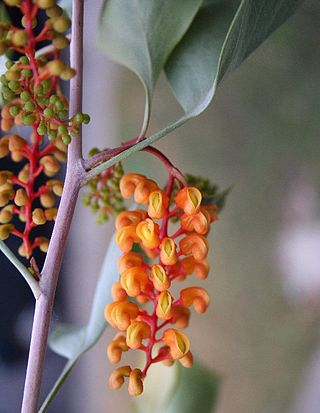
Grevillea wickhamii, commonly known as Wickham's grevillea, holly-leaf grevillea or lgarrmari in Djaru, is species of flowering plant in the family Proteaceae and is endemic to northern Australia. It is an erect shrub or spindly tree with holly-like, broadly egg-shaped leaves with 2 to 7 shallow teeth, and down-curved clusters of flowers, the colour depending on subspecies.

Grevillea sericea, commonly known as the pink spider flower, is a species of flowering plant in the family Proteaceae and is endemic to New South Wales. It is a shrub with elliptic to lance-shaped leaves with the narrower end towards the base, and clusters of usually pink flowers arranged on one side of a flowering rachis.

Grevillea rhyolitica, commonly known as Deua grevillea or Deua flame, is a species of flowering plant in the family Proteaceae and is endemic to south-eastern New South Wales. It is a more or less erect shrub with elliptic leaves and hairy red flowers.
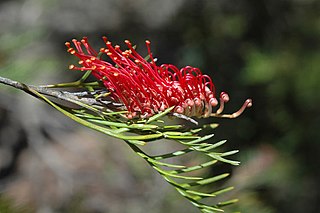
Grevillea hookeriana, commonly known as red toothbrushes or Hooker's grevillea, is a species of flowering plant in the family Proteaceae and is endemic to the south-west of Western Australia. It is a spreading to erect shrub, usually with linear leaves or deeply divided leaves with linear lobes, and toothbrush-shaped groups of red, black or yellowish green flowers, the style maroon to black.
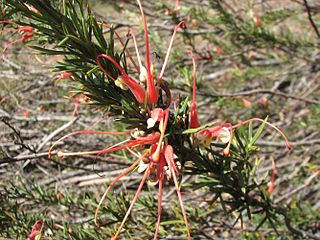
Grevillea tripartita is species of flowering plant in the family Proteaceae and is endemic to the south-west of Western Australia. It is an erect, prickly shrub with divided leaves with 3 lobes, and clusters of red and cream-coloured or reddish-orange and yellow flowers.
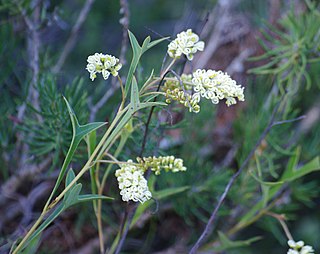
Grevillea synapheae, commonly known as catkin grevillea, is species of flowering plant in the family Proteaceae and is endemic to the southwest of Western Australia. It is a prostrate to erect shrub usually with divided leaves with 3 to 7 triangular to more or less linear lobes, and clusters of white to creamy yellow flowers.

Grevillea irrasa is a species of flowering plant in the family Proteaceae and is endemic to south-eastern New South Wales. It is an erect, spreading shrub with oblong to egg-shaped leaves with the narrower end towards the base, and clusters of red to apricot-coloured flowers.
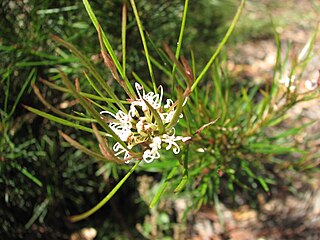
Grevillea neurophylla, commonly known as granite grevillea, is a species of flowering plant in the family Proteaceae and is endemic to south-eastern continental Australia. It is a spreading to erect shrub with linear leaves, and clusters of white to pale pink flowers with a strongly hooked style.
Grevillea parviflora, commonly known as small-flower grevillea, is a species of flowering plant in the family Proteaceae and is endemic to the Sydney region of eastern New South Wales. It is a low, dense, spreading to erect shrub with more or less linear leaves and white flowers with a red style that sometimes turns red as it ages.

Grevillea patulifolia, commonly known as swamp grevillea, is a species of flowering plant in the family Proteaceae and is endemic to south-eastern continental Australia. It is an erect, or low spreading shrub with more or less linear to narrowly elliptic leaves, and large clusters of pale pink to dark mauve-pink flowers with a style that is hooked near its tip.
Grevillea obtusiflora is a species of flowering plant in the family Proteaceae and is endemic to a small area of eastern New South Wales. It is a low, spreading to erect shrub with many stems, narrowly elliptic to oblong or linear to narrowly egg-shaped leaves with the narrower end towards the base, and pinkish-red and cream-coloured flowers with a red style.
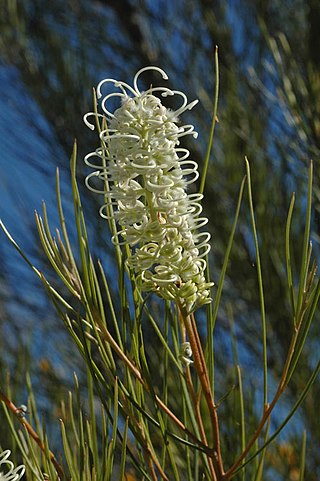
Grevillea pterosperma, commonly known as desert grevillea or desert spider-flower, is a species of flowering plant in the family Proteaceae and is endemic to continental Australia. It is an erect, rounded shrub with linear leaves, sometimes divided with up to six linear lobes, and cylindrical clusters of greyish white and creamy white flowers with a cream-coloured to pale yellow style.

Grevillea viridiflava, commonly known as linear-leaf grevillea, is species of flowering plant in the family Proteaceae and is endemic to eastern Australia. It is an erect, spindly shrub with linear to narrowly elliptic leaves, and clusters of 12 to 24 white flowers with a yellowish-green or cream-coloured style.
Grevillea nematophylla, commonly known as water bush or silver-leaved water bush, is a species of flowering plant in the family Proteaceae and is endemic to Australia. It is shrub or small tree with simple or pinnatisect leaves, the leaves or lobes linear, and branched, cylindrical clusters of cream-coloured flowers.

Grevillea humilis is a species of flowering plant in the family Proteaceae and is endemic to eastern New South Wales. It is an erect to spreading shrub with narrowly elliptic to more or less linear leaves, and pink or white flowers.

Grevillea florida is a species of flowering plant in the family Proteaceae and is endemic to the south-west of Western Australia. It is a erect, low shrub with linear to narrowly elliptic leaves, and clusters of hairy, white to creamy yellow flowers with a yellow- or orange-tipped style that ages to red.

Grevillea pyramidalis, commonly known as the caustic bush, is a species of flowering plant in the family Proteaceae and is endemic to north-western Australia. It is an erect, spindly shrub or small tree with simple linear or pinnatisect leaves with linear to narrowly egg-shaped lobes, and white to yellow or cream-coloured flowers.
Grevillea secunda is a species of flowering plant in the family Proteaceae and is endemic to inland Western Australia. It is a spreading shrub with divided leaves, the end lobes cylindrical and sharply pointed, and clusters of pinkish-red flowers with a red style arranged on one side of the floral rachis.
















